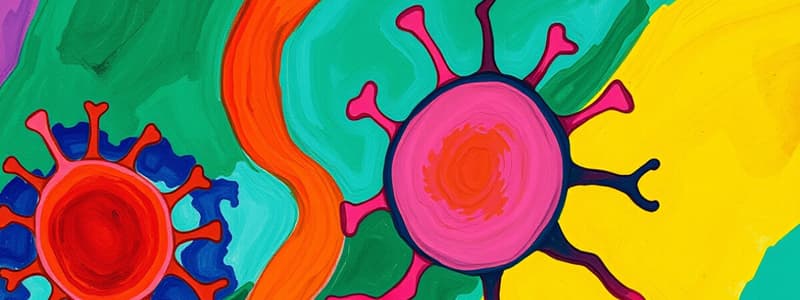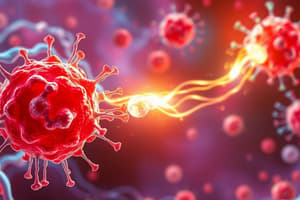Podcast
Questions and Answers
What is the primary function of cytotoxic T cells?
What is the primary function of cytotoxic T cells?
- To enhance the function of B lymphocytes
- To secrete antibodies against pathogens
- To trigger apoptosis in target cells (correct)
- To produce memory cells for future immunity
Which characteristic is specifically associated with cytotoxic T cells?
Which characteristic is specifically associated with cytotoxic T cells?
- Round nucleus with basophilic cytoplasm (correct)
- Secretion of interleukins
- Presence of CD4 coreceptors
- Production of immunoglobulins
What triggers the activation of cytotoxic T cells?
What triggers the activation of cytotoxic T cells?
- Antigen presentation by APCs (correct)
- Direct interaction with pathogens
- Stimulation by B cells
- Presence of antibodies in circulation
What type of cells do cytotoxic T cells primarily target?
What type of cells do cytotoxic T cells primarily target?
What is the significance of perforins released by cytotoxic T cells?
What is the significance of perforins released by cytotoxic T cells?
What characteristic distinguishes the large granular lymphocytes described in the content?
What characteristic distinguishes the large granular lymphocytes described in the content?
Which function is NOT associated with the light region of the germinal center?
Which function is NOT associated with the light region of the germinal center?
How do the lymphocytes in the dark region of the secondary lymphoid nodules differ from those in the light region?
How do the lymphocytes in the dark region of the secondary lymphoid nodules differ from those in the light region?
What type of cells does the dark region contain within the cellular framework of stellate cells?
What type of cells does the dark region contain within the cellular framework of stellate cells?
What distinguishing feature relates to the cell types that are killed directly by large granular lymphocytes?
What distinguishing feature relates to the cell types that are killed directly by large granular lymphocytes?
What is the primary role of Helper T cells in the immune response?
What is the primary role of Helper T cells in the immune response?
Which of the following statements is true regarding immune response and graft viability?
Which of the following statements is true regarding immune response and graft viability?
In the context of lymphocyte types, which statement best describes Natural Killer (NK) cells?
In the context of lymphocyte types, which statement best describes Natural Killer (NK) cells?
What does the term 'MHC-II restricted' imply about Helper T cells?
What does the term 'MHC-II restricted' imply about Helper T cells?
Which loci are primarily typed for determining HLA compatibility in organ transplantation?
Which loci are primarily typed for determining HLA compatibility in organ transplantation?
Which cells are primarily responsible for presenting antigens to activate T cells?
Which cells are primarily responsible for presenting antigens to activate T cells?
What is the CD4 normal count range for healthy adults and teens?
What is the CD4 normal count range for healthy adults and teens?
What condition is indicated by a CD4 count of less than 200?
What condition is indicated by a CD4 count of less than 200?
The Major Histocompatibility Complex (MHC) is located on which chromosome?
The Major Histocompatibility Complex (MHC) is located on which chromosome?
Which type of macrophages are known as Kupffer cells?
Which type of macrophages are known as Kupffer cells?
Which type of T cells are restricted by MHC-I molecules?
Which type of T cells are restricted by MHC-I molecules?
What is the primary role of the Major Histocompatibility Complex (MHC) on antigen-presenting cells?
What is the primary role of the Major Histocompatibility Complex (MHC) on antigen-presenting cells?
What type of cells primarily make up the mononuclear phagocytic system?
What type of cells primarily make up the mononuclear phagocytic system?
What is the outcome of positive selection for T cells in the thymic cortex?
What is the outcome of positive selection for T cells in the thymic cortex?
What percentage of T-lymphocytes make it through the selection process to become functional?
What percentage of T-lymphocytes make it through the selection process to become functional?
Where does negative selection primarily occur in the thymus?
Where does negative selection primarily occur in the thymus?
What is the primary function of the cytoreticulum in the thymus?
What is the primary function of the cytoreticulum in the thymus?
What characterizes the progression of pre-T lymphocytes during maturation?
What characterizes the progression of pre-T lymphocytes during maturation?
What is the role of the Hassall's corpuscles found in the thymic medulla?
What is the role of the Hassall's corpuscles found in the thymic medulla?
What happens to T-cells that strongly bind self-antigens presented by dendritic cells?
What happens to T-cells that strongly bind self-antigens presented by dendritic cells?
What can result from the loss of thymus functionality?
What can result from the loss of thymus functionality?
Flashcards are hidden until you start studying
Study Notes
Antigen-Presenting Cells
- Antigen-presenting cells (APCs) phagocytose and process antigens, presenting them to T cells for activation.
- Normal CD4 count for healthy adults and teens ranges from 500 to 1,600 cells/mm³.
- A CD4 count below 200 indicates susceptibility to infections, including AIDS.
Major Histocompatibility Complex (MHC)
- Most APCs belong to the mononuclear phagocytic system.
- MHC genes are located on the short arm of chromosome 6 (6pQ).
- Specialized integral membrane proteins, MHC-I binds to cytotoxic T cells (CD8) while MHC-II binds to helper T cells (CD4).
Lymphocytes
- Lymphocytes include T cells and B cells and are critical constituents of lymphatic tissue.
- Cytotoxic T cells destroy virus-infected, foreign, or malignant cells by releasing perforins that trigger apoptosis.
- Helper T cells (CD4) are facilitated by MHC-II in activating immune responses.
Immune Response and HLA Matching
- Immune response is a determinant of graft viability; HLA typing is crucial for organ transplants in renal, lung, cardiac, and pancreatic cases.
- Loci involved in HLA typing are HLA-A, -B, and -DR.
Natural Killer (NK) Cells
- NK cells are large granular lymphocytes that play roles in innate and adaptive immunity.
- They destroy unhealthy host cells including those infected with viruses or bacteria, and potentially tumorigenic cells, without needing prior sensitization.
Structure of Secondary Lymphoid Nodules
- Secondary nodules consist of a dark region (mantle/marginal zone) and a light region (germinal center).
- The dark area contains mature lymphocytes with condensed chromatin while the lighter area includes less mature lymphocytes undergoing division.
Thymus and T-Cell Maturation
- The thymus has a corticomedullary barrier and supports the maturation of T cells.
- Thymocytes undergo a stringent selection process ensuring a functional T-cell receptor (TCR) that does not bind self-antigens strongly.
- Positive selection occurs in the cortex allowing T cells that recognize MHC molecules to survive, while negative selection in the medulla eliminates T cells that bind self-antigens.
Thymus Cell Types and Functions
- Thymic epithelial cells (TECs) provide structural support and express organ-specific proteins.
- Hassall's corpuscles are aggregates of TECs found in the medulla, significant in T cell selection.
T-Cell Mediated Immunity
- Only about 2% of T lymphocytes produced will mature and populate secondary lymphoid organs, representing a significant selection process to maintain immune tolerance and functionality.
Studying That Suits You
Use AI to generate personalized quizzes and flashcards to suit your learning preferences.



